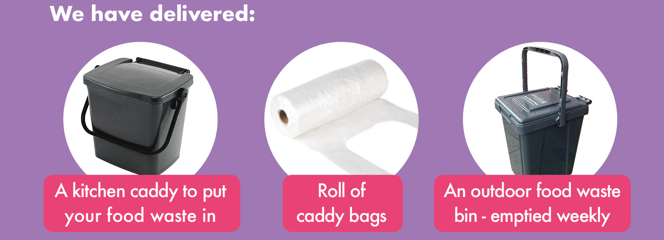Food Waste
Food Waste
We have introduced a food waste recycling service to around 5,000 households in the city. Households who are within the trial area will be contacted directly.
Around half of all residents in England already have a weekly food waste collection. From April 2026, the Government has stated that every household in England must receive a weekly food waste collection, providing households the opportunity to reduce and recycle their food waste.
Getting Started
If you have received your food waste starter kit, shown below, you can get started easily!

Keeping your outdoor food waste bin locked will prevent pets, animals and pests getting in.
Collections
Food waste is collected weekly on your normal bin collection day. Please put the larger outdoor food waste bin on the boundary of your property (your collection point will be noted on your bin) by 6:30am and make sure it is visible. It will be collected at a different time to your other bin.
Please give us until the end of the day to collect your food waste.
We will provide you with free bags, or you can use any plastic bag you have available, to line your caddy. To request more bags, please tie a bag to the handle of your outdoor food waste bin and the crew will leave you some more.
Why Recycle Your Food Waste?
- Your general waste will reduce, be cleaner and less smelly.
- Food waste makes up a third of the average household waste bin and is now recyclable.
- Less waste is sent to landfill which helps improve our environment.
- It's taken to a special plant where it is used to generate renewable energy and produces a fertiliser to grow crops.
What food can I recycle?
Will my bin smell?
Food waste is collected weekly, so this will help to reduce any smells. Remember to empty your kitchen caddy into your outdoor food waste bin regularly and give them a rinse to keep them fresh.
What if I don’t produce any food waste?
There is no amount too small. The best thing we can do with our food is enjoy it, but some waste is unavoidable like banana skins, tea bags and vegetable peelings all of which can be recycled.
Replacement bin?
If you have lost your outdoor food waste bin or have recently moved into a property in the food waste collection area and don’t have one please contact us via the feedback form below.
How can I reduce my food waste?
Planning meals, storing food correctly and being creative with your leftovers can help reduce the amount of food that ends up in your bin.
For tips, recipe ideas and advice on how to waste less food and save up to £1000 a year, visit www.lovefoodhatewaste.com
It's a new service, for you and for us...
If you still have questions about your new food waste recycling service and can't see the answer on this page, you can give us feedback on:
Related Pages
Need more information?
Please use the contact form at the end of the page to reach the teams if you have any food waste queries.
For details about other bin collection services please call 0191 2787878 and ask for "Your Local Services." They can also pass queries to the Food Waste team on your behalf.